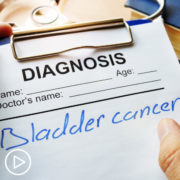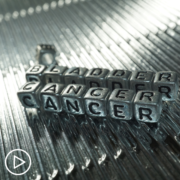What Do You Need To Know About Bladder Cancer?
What Do You Need To Know About Bladder Cancer? from Patient Empowerment Network on Vimeo.
What should you or your loved ones know following a bladder cancer diagnosis? This animated video reviews the diagnosis and types of bladder cancer, current treatment options, and key advice for taking an active role in your care.
See More From The Pro-Active Bladder Cancer Patient Toolkit
Related Programs:

|

|

|
Transcript:
What do you need to know if you or a loved one has been diagnosed with bladder cancer?
Bladder cancer occurs when cells in the urinary bladder grow out of control. As more cancer cells develop, they can form a tumor. And, over time, may spread to other parts of the body.
The most common type of bladder cancer is transitional cell carcinoma or T.C.C.. This may also be referred to as urothelial carcinoma. Other subtypes include: Squamous cell carcinoma, adenocarcinoma, small cell bladder cancer and, sarcomatoid carcinoma.
How bladder cancer is treated depends on the stage. The stages of bladder cancer include: Stage 1, which indicates that the cancer is growing in the inner lining layer of the bladder only. Stage 2 occurs when the cancer is growing into the inner or outer muscle layer of the bladder wall. Stage 3 means that the cancer has grown beyond the muscle layer and into fatty tissue that surrounds the bladder. And, Stage 4 indicates that the cancer is growing outside of the pelvic region and has spread to distant sites, such as the lung, liver, or bones. When cancer has spread to other organs in the body, it is considered metastatic cancer.
When making a treatment choice, your doctor may also consider age, any comorbidities, potential side effects, and the results of biomarker testing, as well as that patient’s preference.
So, what are the treatment options for bladder cancer? For early stage, or non-muscle-invasive, bladder cancer patients, doctors may use a form of immunotherapy instilled in the bladder called B.C.G. which stands for Bacillus Calmette-Guerin. B.C.G. is used to inhibit the cancer’s growth and prevent recurrence.
If patients do not respond or recur after B.C.G., a radical cystectomy – a surgical procedure to remove the bladder, is offered. In select patients, pembrolizumab, a form of immunotherapy, can be used as an alternative.
For localized bladder cancer invading the muscle, treatment is typically chemotherapy, followed by surgery. Tri-modality treatment using chemotherapy along with radiation is an option for patients who are not candidates for surgery – or refuse surgery – and who meet criteria for bladder preservation.
Surgery, including a urostomy where the bladder is removed and replaced with a stoma outside of their bodies, is a major procedure reserved for patients who are very fit with low comorbidities.
Now that you understand a little more about your bladder cancer and treatment options, how can you take an active role in your care?
First, continue to educate yourself about your condition. Ask your doctor for patient resources or visit powerfulpatients.org/bladdercancer for more information.
Understand the goals of your treatment and ask whether a clinical trial might be right for you.
You should also consider a second opinion or consult with a specialist following a diagnosis.
Try to write down your questions before and during your appointments. And bring a friend or loved one to your appointments to help you recall information and to keep track of important details.
Finally, remember that you have a voice in your care. Don’t hesitate to ask questions and to share your concerns. You are your own best advocate.
To learn more about bladder cancer and to access tools for self-advocacy, visit powerfulpatients.org/bladdercancer.









